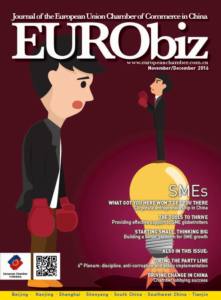 The European Chamber has long advocated for the interests of European SMEs in China. In the EU they are important sources of employment – over the past five years, SMEs have created around 85 per cent of new jobs and provided two-thirds of total private sector employment.[1] Improving the business environment for SMEs in China should therefore be prioritised accordingly.
The European Chamber has long advocated for the interests of European SMEs in China. In the EU they are important sources of employment – over the past five years, SMEs have created around 85 per cent of new jobs and provided two-thirds of total private sector employment.[1] Improving the business environment for SMEs in China should therefore be prioritised accordingly.
To its credit the Chinese Government has begun to pay more attention to SMEs in recent years, as it works to foster new drivers of economic growth and employment. For example, in September 2015, Prime Minister Li Keqiang announced the establishment of a National SME Development Fund with euro (EUR) eight billion of capital,[2] with the first sub-fund dispersing EUR 36 million to 14 projects by the end of August 2016.[3] Unfortunately, it is still unclear whether or not European companies will be able to participate in this fund; by contrast, Chinese investors that take stakes in European SMEs are very much eligible for EU funding for R&D.
The revised draft of the SME Promotion Act, which was released on 31st October, 2016, addresses some of the issues faced by EU SMEs. These include problems related to late payments; access to finance and non-banking finance; alleviation of administrative burdens; improving coordination of different government departments; protection of intellectual property rights at the local level; and their exclusion from public procurement processes. Ensuring that these issues remain in the final text of the SME Promotion Act would go some way towards establishing a business ecosystem in which SMEs can thrive.
These issues do not just pose challenges for European SMEs in China, though. They also seriously impact the ability of domestic Chinese SMEs to succeed, especially in industries where the dominant position of state-owned enterprises prevents them from gaining market access. As we see with Germany’s ‘hidden champions’, SMEs are often technological leaders in their field. Denying them the opportunity to fully participate in the market therefore has direct implications on China’s ability to drive innovation. At a Chamber event in May 2016, an Assistant Director General from the Ministry of Industry and Information Technology (MIIT) implicitly recognised this when he noted that SMEs are major research and development (R&D) and manufacturing contributors, accounting for 25 per cent of all new products in the market.[4]
Eradicating this opportunity gap is extremely important for the future of China’s economy. The Chamber’s Business Confidence Survey 2016 found that nimble SMEs are more optimistic than their larger counterparts regarding their operations in China, with fewer of them planning to cut costs here and more of them willing to make increased contributions. Therefore the faster that China’s business ecosystem is improved, the sooner European SMEs will expand their local operations and R&D investments, take on additional hires and make larger tax contributions. The Chamber will continue to advocate on behalf of EU SMEs, to ensure that the National SME Development Fund and final text of the SME Promotion Act be used to turn the Chinese Government’s admirable goals into reality.
To end on a personal note, as we ease towards the end of the year, the winter weather begins to bite, and, at least for me, the waistline is challenged by Christmas temptations, I would like to extend my warmest greetings of the season to all. I wish you a relaxing time with your family and friends and a happy and prosperous Year of the Rooster. According to the Chinese zodiac, roosters are loyal, honest, bright communicative and ambitious, characteristics that I hope will define the Chamber in 2017. In some cultures roosters are even thought to ward off evil spirits – something we could perhaps all do with as protectionist forces continue to gather… I look forward to seeing you all in good spirits in 2017.
Jörg Wuttke
President
European Chamber of Commerce in China
[1] Entrepreneurship and Small and Medium-sized Enterprises (SMEs), European Commission, viewed 8th November, 2016, <http://ec.europa.eu/growth/smes>
[2] Li Keqiang chaired a State Council executive meeting, State Council, 1st September, 2015, viewed 8th November, 2016, <http://www.gov.cn/guowuyuan/2015-09/01/content_2923201.htm>
[3] The Scale of the First Sub-Fund of the National SME Development Fund has Reached a Scale of CNY 60 Billion, Xinhua, 29th August, 2016, viewed 8th November, 2016, <http://news.xinhuanet.com/fortune/2016-08/29/c_129261274.htm>
[4] Taken from a speech delivered by Mr Zhou Pingjun, Assistant Director General, China Centre for the Promotion of SME Development (MIIT), during the EU SME Annual Conference: How to Tackle a Changing China, which took place in Beijing on 31st May, 2016.



Recent Comments